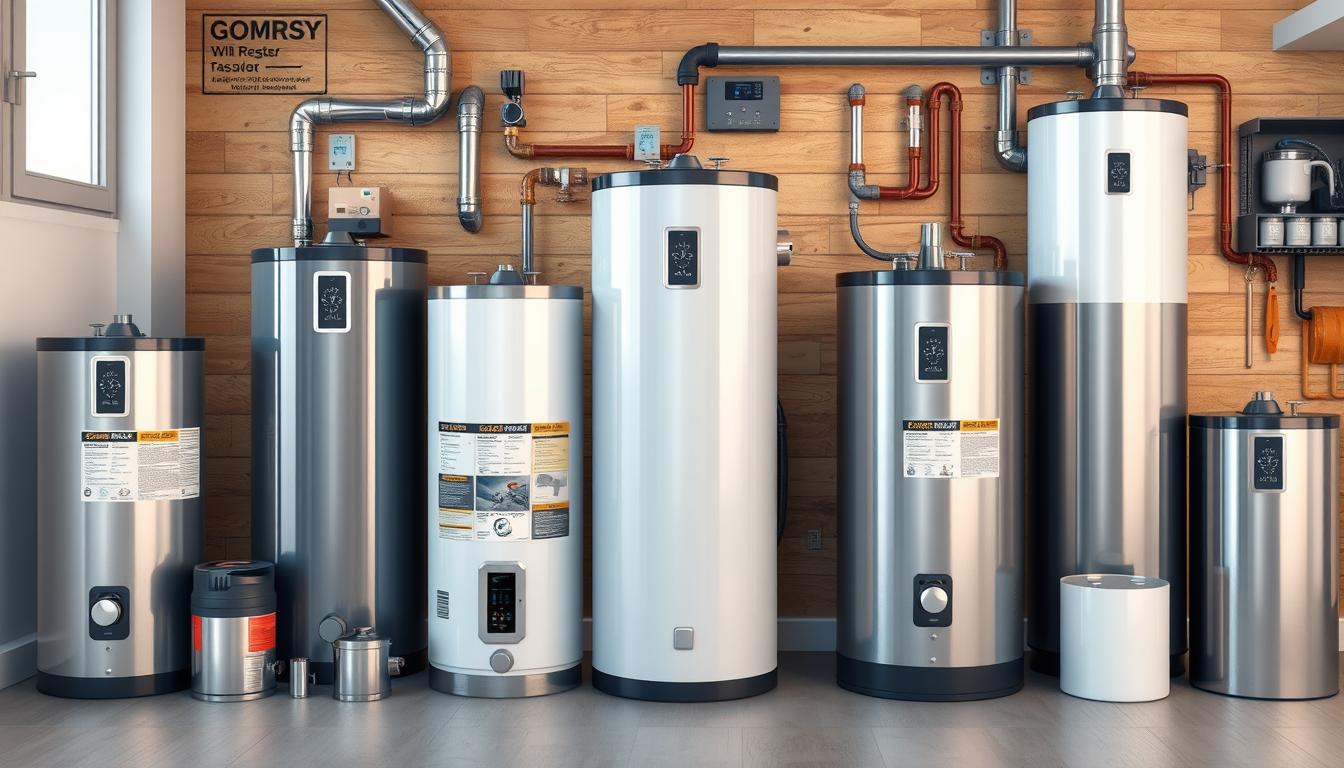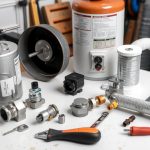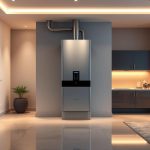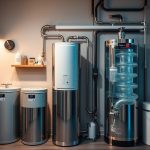I remember a cold winter morning when our old water heater broke. It left our family cold and upset. This taught me how important it is to pick the right water heater.
Choosing a gasoline water heater is more than just hot water. It’s about comfort, saving money, and feeling secure.
Water heating is a big part of our energy use, making up nearly 20% of our monthly bills. The right gas-fired water heater can turn this cost into savings.
In this guide, we’ll cover everything you need to know about picking the best gasoline water heater. We’ll talk about technical specs, installation tips, and more. You’ll get expert advice and practical help.
Key Takeaways
- Gasoline water heaters offer superior heating performance compared to traditional models
- Energy efficiency is key for long-term savings
- Professional installation ensures optimal performance and safety
- Regular maintenance extends water heater lifespan
- Consider fuel availability and local regulations when selecting a unit
What is a Gasoline Water Heater?

A gas-fired water heater is a modern way to heat water at home. It uses natural gas or liquid propane for efficient hot water. These appliances are key to comfortable living, providing hot water for everyday use.
At its heart, a gasoline water heater turns fuel into hot water fast and consistently. It beats electric heaters in both performance and reliability.
Core Components and Functionality
- Gas burner for heating water
- Thermostat for temperature control
- Anode rod to prevent tank corrosion
- Self-cleaning dip tube to minimize sediment
- Safety valves for pressure and temperature regulation
Common Applications
Gas-fired water heaters are great for many homes and small businesses. They are perfect for:
- Single-family homes
- Apartments
- Small businesses
- Remote locations with limited electrical infrastructure
“Gas water heaters provide an uninterrupted hot water supply, even during power outages” – Energy Efficiency Experts
Modern gasoline water heaters meet strict UL 174 code and U.S. Department of Energy standards. They heat water quickly and keep the supply steady. These systems are a smart choice for reliable hot water.
Benefits of Using Gasoline Water Heaters

Finding the right water heater can make your home more comfortable and energy-efficient. Gas water heaters are a top choice for reliable hot water. Experts say gas systems are great for their performance and flexibility.
Cost-Effectiveness of Gas Water Heating
A gas-powered water heater can cut down your utility bills. Natural gas heaters are about 50% cheaper than electric ones. This is because they heat water more efficiently and use less fuel.
- They cost less to run than electric heaters
- Energy Factor (EF) ratings range from .53 to .65
- Tankless models are even more efficient (.83 to .95 EF)
Energy Efficiency Insights
Gas-powered instant water heaters are very energy-efficient. They use less energy, with water heating making up about 15% of home energy use. Direct-vent models use outside air for burning, which boosts efficiency in tight spaces.
“Gas water heaters provide a continuous hot water supply, ensuring no interruptions during peak usage times.”
Quick Heating Times
Gas systems heat water fast, perfect for families needing lots of hot water. A 30-gallon gas heater is enough for a two-person household. More people or extra bathrooms might need a bigger heater.
Recommended safe water temperature: 120°F for optimal comfort and energy efficiency
Types of Gasoline Water Heaters

Gasoline water heaters come in many types for homes and businesses. Knowing the differences helps you pick the right one for your needs.
Tank Water Heaters: Traditional Storage Solutions
Tank water heaters are the old-school way of heating water. They keep a tank of water warm all the time. The PVI Conquest 130 is a classic example.
- Storage capacity of 25-50 gallons
- Constant water temperature maintenance
- Lower upfront costs
Tankless Water Heater Options
Tankless water heaters heat water only when you need it. They don’t need much storage space. There are two main types: input-to-storage and water-tube instantaneous.
| Brand | BTU/H per Gallon | Storage Capacity |
|---|---|---|
| Aerco Innovation | 48,000 | 22 gallons |
| PVI Brigade | 8,000 | 25 gallons |
Portable Water Heater Innovations
Portable water heaters are great for camping, emergencies, and outdoor fun. They give you hot water when you need it most.
“Portable water heaters bridge the gap between convenience and necessity.” – Water Heating Experts Association
Water heating is a big part of your bills, making up 18% of your monthly costs. The right gasoline water heater can save you money and energy.
- Gas water heaters work when the power is out
- Tankless models save on standby heat loss
- Portable options are super flexible
Key Features to Consider
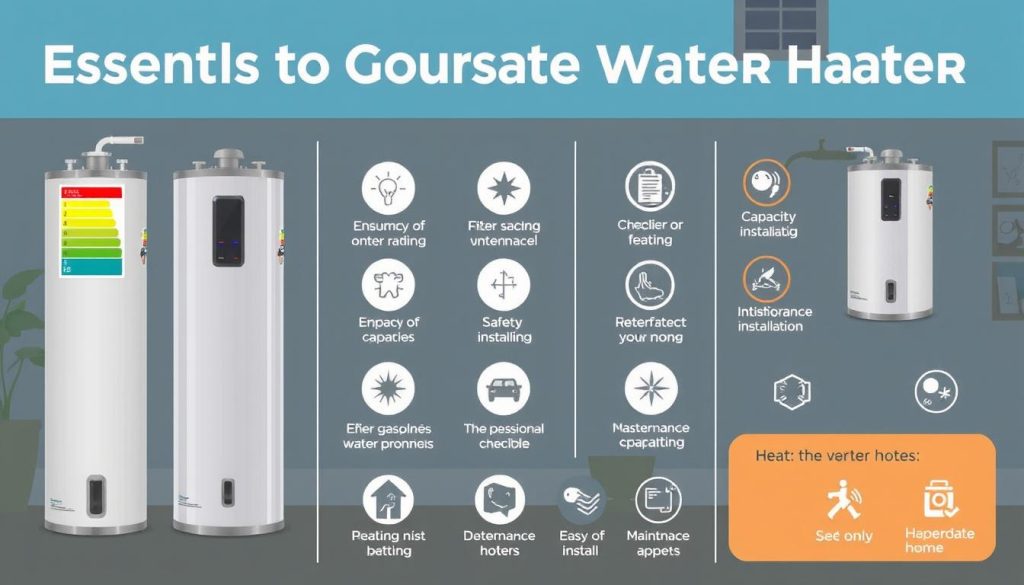
Choosing the right water heater is important. You need to think about key features, whether it’s for outdoor or camping use. Knowing what to look for helps you make a good choice.
Heating Capacity Requirements
Every household uses water differently. Experts say to pick a water heater that gives about 10-15 gallons per person. This keeps hot water flowing without wasting energy.
- Think about how many people live in your home and how much water you use
- Look at the recovery rate (gallons per hour)
- Choose a size that fits your home’s needs
Critical Safety Mechanisms
Safety is key when picking a water heater. Today’s models have special safety features. These help keep you safe and avoid dangers.
| Safety Feature | Purpose |
|---|---|
| Flammable Vapor Ignition Resistant Technology | Prevents possible vapor-related fires |
| Automatic Shut-off Mechanisms | Turns off if there’s a big problem |
| Pressure Relief Valves | Keeps pressure from getting too high |
Space and Size Considerations
If you’re looking for a camping or outdoor water heater, size matters. Modern water heaters come in many sizes. This makes them easy to fit in tight spaces.
“Space-efficient water heaters can be mounted on walls, saving valuable floor space and providing flexible installation options.” – Heating Systems Expert
- Measure where you can put it carefully
- Think about tankless options for less space
- Check the weight and size before buying
When picking a water heater, focus on its heating power, safety features, and size. This ensures it works well and reliably.
Installation Process

Installing a gas-fired water heater needs careful planning and detail. The right installation ensures your home’s hot water system works well and safely.
Getting ready for a gasoline water heater is key. Homeowners must think about several important things for a successful setup.
Choosing the Right Location
Finding the right spot for your gas-fired water heater is important. You need to think about a few things:
- Make sure there’s enough air for ventilation
- Keep it easy to get to for upkeep
- Follow local building rules
- Keep it safe from water damage
- Stay away from things that can catch fire
“The right location can significantly impact your water heater’s efficiency and longevity.” – HVAC Installation Experts
Professional vs. DIY Installation
Some people might try to install it themselves, but it’s best to get a pro. Gasoline water heaters need special gas line connections and venting.
- Pros know the local laws
- They make sure gas lines are right
- They handle the venting needs
- They usually give a warranty
For installing a gas water heater, you’ll need adjustable wrenches, safety glasses, pipe cutters, and special gas connection tools. It’s important to follow the maker’s instructions for safety and performance.
Water heaters made after 2015 have new energy rules. They might need different setup than older ones. Always check the maker’s rules and local codes before starting your project.
Maintenance Tips for Longevity
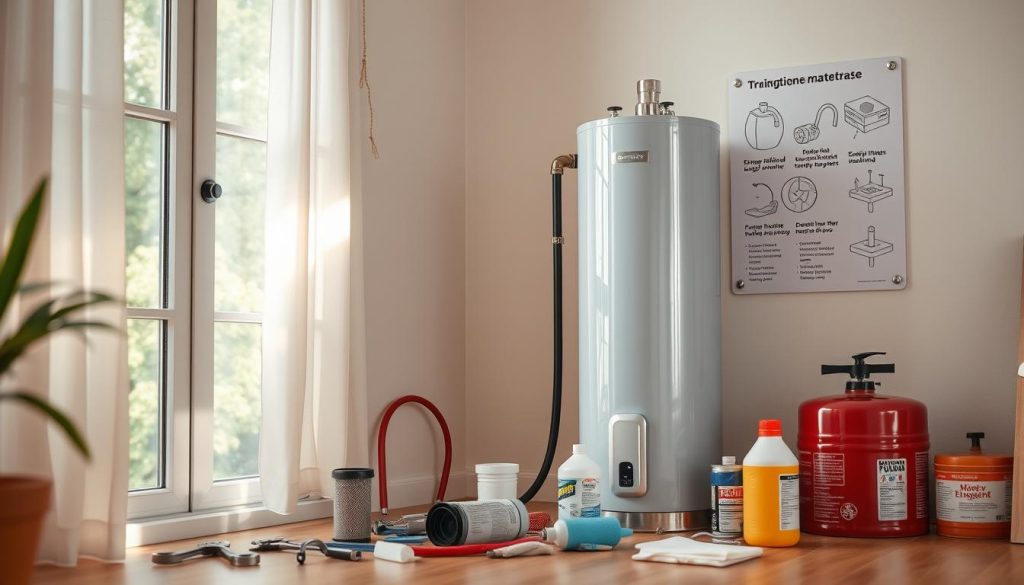
To keep your energy-efficient water heater in great shape, you need to take care of it regularly. This care helps it last longer and work better. It also saves energy.
There are key steps to maintain your water heater. Homeowners can follow these to save money and avoid costly repairs later.
Essential Regular Inspections
- Check for water leaks around connections and valves
- Inspect the anode rod annually for corrosion
- Verify pressure relief valve functionality
- Monitor water temperature settings
Comprehensive Cleaning Procedures
Cleaning your water heater is vital for its performance. Sediment buildup can lower efficiency and harm the unit.
| Maintenance Task | Frequency | Benefits |
|---|---|---|
| Tank Flushing | Annually | Removes sediment, improves efficiency |
| Anode Rod Inspection | Every 2-3 years | Prevents tank corrosion |
| Pipe Insulation | As needed | Reduces heat loss up to 45% |
“Consistent maintenance can extend your water heater’s life by up to 5 years and reduce energy costs by 10%.”
By following these maintenance tips, your water heater will work its best. This saves you money and prevents sudden breakdowns.
Safety Precautions

It’s important to stay safe when using a gas-fired water heater. Homeowners need to know the risks and take steps to keep their families and homes safe.
Ventilation Requirements
Good ventilation is key for a gas-fired water heater. An outdoor unit needs special ventilation to avoid gas buildup. Here are some important guidelines:
- Ensure vent diameter matches the tank’s draft diverter
- Use double-walled vents when passing through walls or roofs
- Maintain clear airflow around the water heater
- Keep an 18-inch minimum boundary around the unit
Carbon Monoxide Detection
Carbon monoxide is a big danger at home. Sadly, it kills 200 people every year and harms 10,000 more.
“The silent killer demands vigilant protection.” – Safety Experts
| Safety Recommendation | Action Required |
|---|---|
| Carbon Monoxide Detectors | Install near water heater and sleeping areas |
| Emergency Preparedness | Keep gas shut-off valve accessible |
| Regular Maintenance | Annual professional inspection |
Important safety steps for gas-fired water heaters include removing flammable materials and keeping the temperature right. Being proactive can stop deadly accidents.
Fuel Storage and Handling
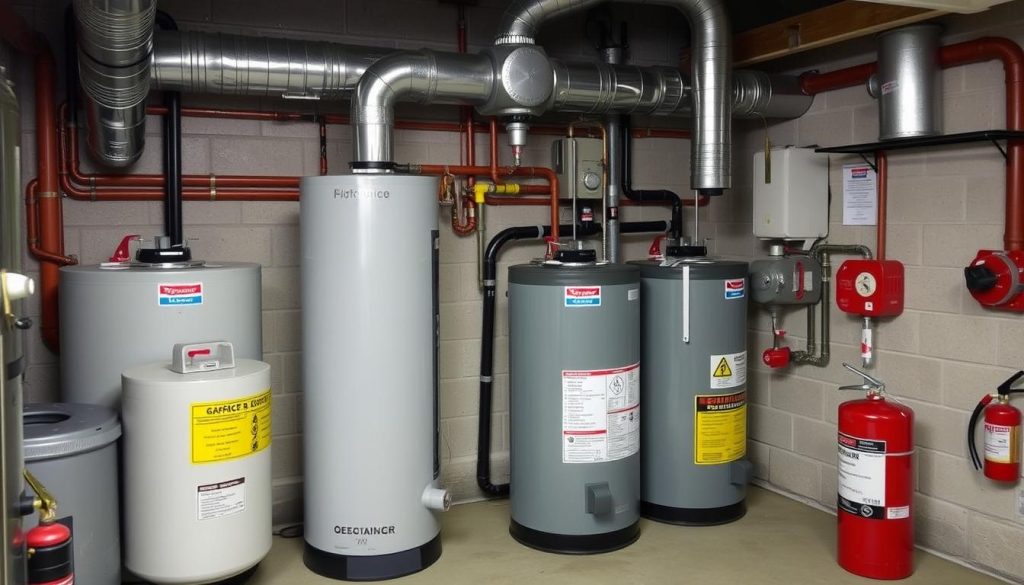
Proper fuel storage is key when using a gasoline water heater. Knowing the right steps can avoid dangers and keep your portable water heater safe.
Safe Storage Practices for Fuel
Storing gasoline needs careful attention. Here are some tips to keep you safe when dealing with fuel for your water heater:
- Use only approved safety containers with tight-fitting lids
- Store containers at room temperature
- Keep fuel away from heat sources and ignition points
- Store in a detached shed or garage at least 50 feet from buildings
Critical Storage Considerations
Gasoline is very flammable because it has a low flash point of -45 degrees Fahrenheit. Careful handling is key to avoid accidents.
| Storage Requirement | Recommended Practice |
|---|---|
| Container Size | 5 gallons or less |
| Storage Duration | Use within 1 month; can remain quality for up to 6 months |
| Distance from Buildings | Minimum 40-50 feet |
“Safety in fuel storage is not an option, it’s a necessity for responsible portable water heater owners.”
Local Regulations and Compliance
Always check local rules for fuel storage with your gasoline water heater. Different places have their own rules for:
- Maximum fuel storage quantities
- Storage location restrictions
- Required safety equipment
- Disposal and handling procedures
Good fuel management keeps your portable water heater safe and efficient. It also protects your property and family.
Comparing Gasoline Water Heaters to Other Fuel Types

Choosing the right water heater means knowing the differences between fuel types. Homeowners must decide between gasoline, electric, and propane water heaters.
There are many water heating options, each with its own benefits and drawbacks. The right choice depends on energy efficiency, installation costs, and local prices.
Electric Water Heaters
Electric water heaters are a common choice for many homes. They have:
- Lower upfront installation costs
- Typically more expensive to operate
- Simpler maintenance requirements
- No direct combustion emissions
Electric water heaters cost more to run than gas models. High electricity rates lead to higher long-term costs.
Propane Water Heaters
Propane water heaters are a more efficient choice than gasoline models. They offer:
- Higher energy efficiency
- Faster water heating times
- Lower carbon emissions
- Reliable performance in various climates
“Propane water heaters combine performance with environmental consciousness” – Energy Efficiency Experts
Natural gas water heaters use about 10% less energy than electric ones. This means big savings for homeowners over time.
| Water Heater Type | Average Lifespan | Operating Cost |
|---|---|---|
| Electric Water Heater | 10-15 years | Higher |
| Propane Water Heater | 12-15 years | Moderate |
| Tankless Water Heater | 20-25 years | Lower |
When picking a water heater, think about local energy prices, installation needs, and long-term efficiency. This will help you make a smart choice.
Top Brands in the Market

Choosing the right gasoline water heater means knowing the top brands. There are many good brands for energy-efficient water heaters. Each brand has its own benefits and new tech.
The water heater market has some top brands known for quality and reliability. Let’s look at the main players and their reputation.
Key Players in the Water Heater Industry
- Bosch: Leader in trustworthiness with a Net Trust Quotient Score of 109.2
- Whirlpool: Second-highest trusted brand with a score of 108.9
- Rheem: Prominent manufacturer of gasoline water heaters
- AO Smith: Known for consistent quality and performance
Comparing Brand Reputation
When picking a gasoline water heater, look at more than just the price. Think about reliability, customer service, and energy savings. These factors help you make a smart choice.
| Brand | Trust Score | Key Strengths |
|---|---|---|
| Bosch | 109.2 | Innovative technology, reliable performance |
| Whirlpool | 108.9 | Wide product range, competitive pricing |
| Rheem | 107.2 | Robust energy-efficient water heater models |
| AO Smith | 102.7 | Durable construction, long-lasting units |
Before buying, check local suppliers, compare warranties, and look at each brand’s water heaters. Getting a pro to install and maintain it can make it last longer.
Pro tip: Always verify warranty coverage and seek recommendations from certified plumbing professionals when selecting a gasoline water heater.
Understanding Energy Ratings
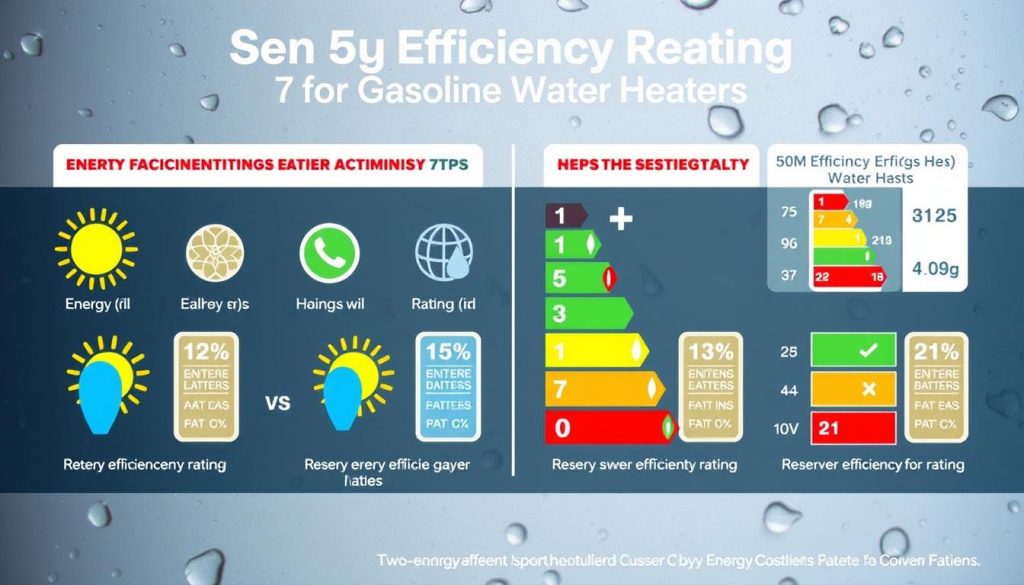
Exploring energy-efficient water heaters can be tough. Energy ratings are key to making smart choices for your home’s water heating.
Importance of Energy Efficiency Ratings
Energy ratings show how well a water heater works. The U.S. Department of Energy introduced the Uniform Energy Factor (UEF) in 2017. It helps compare different water heaters’ efficiency.
- UEF ratings range from 0 to 1, with higher values indicating better performance
- Traditional water heaters typically have UEF ratings between 0.63 and 0.95
- ENERGY STAR certified heat pump water heaters can reach UEF ratings of 3.3 to 4.1
How to Read Energy Labels
Reading energy labels is important. You need to know about the First Hour Rating (FHR) and UEF. These show how efficient a water heater is.
| Water Heater Type | Typical UEF Range | Energy Efficiency |
|---|---|---|
| Traditional Tank Models | 0.63 – 0.95 | Standard Efficiency |
| Heat Pump Water Heaters | 3.3 – 4.1 | High Efficiency |
| Tankless Models | 0.80 – 0.95 | Above Average Efficiency |
“A higher UEF means more energy savings and lower operational costs for homeowners.” – Energy Efficiency Experts
When picking an energy-efficient water heater, look at the UEF rating, tank size, and First Hour Rating. This ensures it meets your household’s needs.
Product Reviews and Recommendations
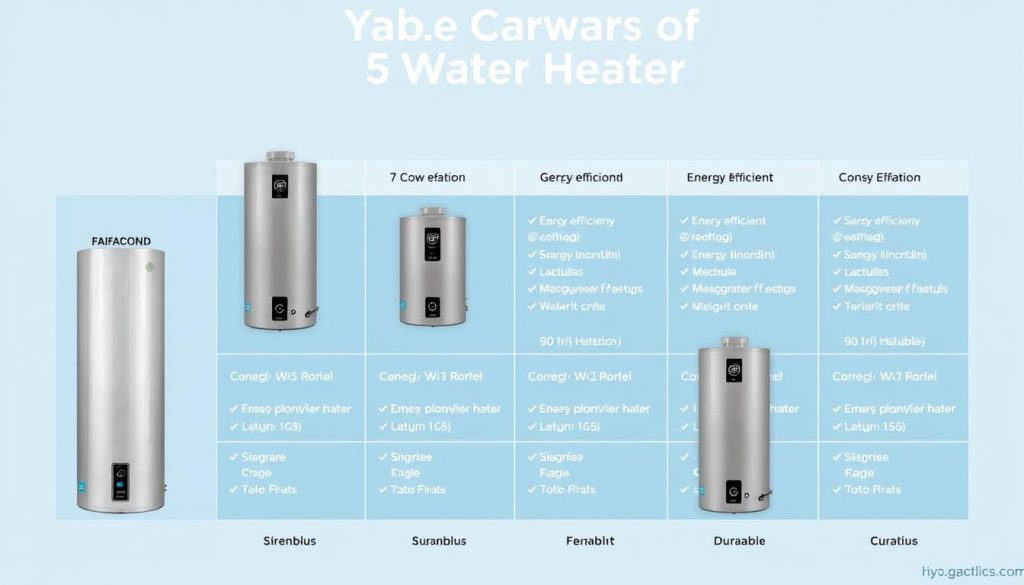
Finding the right gasoline water heater needs careful research. We’ve looked into the best tankless water heaters for 2023. We highlight their performance and what users say.
Top Performing Gasoline Water Heater Models
After a detailed analysis, we found some top picks:
- Rinnai Gas Tankless Hot Water Heater
- Maximum flow rate: 6.5 GPM
- Warranty: 10-year heat exchanger, 5-year labor, 1-year parts
- GASLAND Portable Gas Water Heater
- Flow rate: 1.6 GPM
- Ideal for outdoor and mobile applications
User Feedback and Ratings
Plbg.com talks show what users really think. Rheem and A.O. Smith get lots of praise for being reliable and efficient.
“Choosing the right gasoline water heater is about balancing performance, durability, and long-term value.” – Professional Plumbing Expert
Key Considerations for Selection
When picking a tankless water heater, think about these:
- Flow rate capabilities
- Warranty coverage
- Energy efficiency ratings
- Installation requirements
Experts say it’s best to let pros install water heaters. This ensures they work well and keeps warranties valid.
Cost Analysis
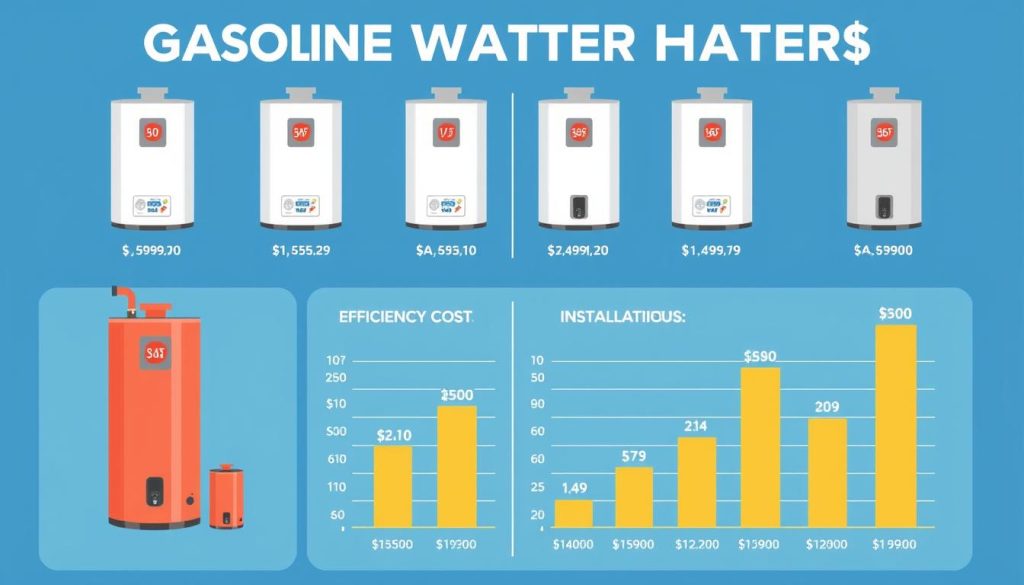
Choosing an energy-efficient water heater means looking at both the initial cost and long-term savings. Homeowners need to understand the full cost when picking a gas-fired water heater.
Upfront Costs vs. Long-Term Savings
Water heaters come with different prices:
- Basic models start at $130.99
- High-end systems can reach $5,500
- Gas water heaters usually cost between $700 and $2,700
Budgeting for Installation and Maintenance
There are costs beyond the initial price. Installation costs for gas-fired water heaters vary based on needs.
| Expense Category | Cost Range |
|---|---|
| Average Installation | $900 – $3,000 |
| Plumber Labor | $50 – $200 per hour |
| Monthly Operating Costs | $16 – $22 |
“Investing in an energy-efficient water heater is not just about immediate costs, but long-term savings and performance.”
Gas water heaters have many financial benefits:
- 8% to 34% more energy-efficient than traditional tank models
- Lower ongoing energy expenses
- Faster water heating capabilities
- Continuous hot water supply during power outages
By weighing upfront costs, installation, and energy savings, homeowners can find the best gas-fired water heater.
Environmental Impact
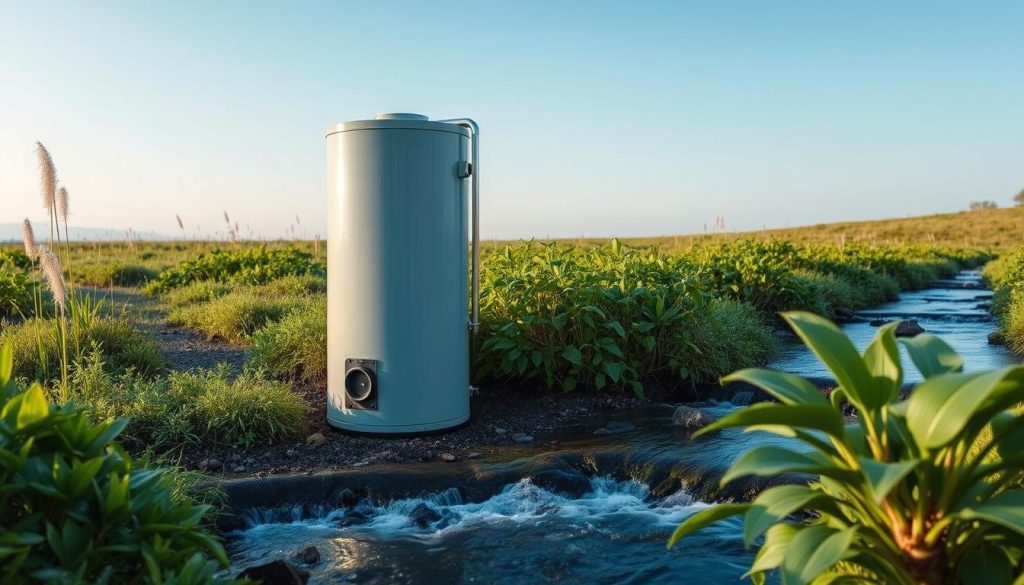
Water heating is a big environmental worry for homeowners looking for green solutions. Gasoline water heaters are key in how much energy homes use. They also affect carbon emissions and how sustainable we are.
To really get how water heating affects the planet, we need to look at it all. Gas boilers for hot water make about 2,200 kg of CO2 each year. This makes them a big source of greenhouse gas emissions in homes.
Emissions and Sustainability Challenges
The impact of water heaters goes beyond just CO2. Water heating uses about 17% of a family’s energy, which is about 4,000 watts a year. Homeowners can cut their carbon footprint by making smart choices:
- Choose energy-efficient water heaters
- Use good insulation
- Adjust the temperature right
- Look into other heating options
Eco-Friendly Practices for Reduced Emissions
New ways can really help lessen our environmental impact. Here are some ideas for a greener water heating setup:
| Technology | Energy Savings | CO2 Reduction |
|---|---|---|
| Heat Pump Water Heaters | Up to 70% less energy | Big cut in emissions |
| Solar Water Heating | 40-50% less energy use | Almost no direct emissions |
| Tankless Systems | 10% more savings | Less carbon footprint |
Choosing an energy-efficient water heater is more than just a tech choice. It’s a promise to care for our planet. Lowering the water heater by 10°F can save 3-5% on energy costs each year. This shows how small changes can make a big difference for the environment.
Every degree of efficiency is a step toward a more sustainable future.
Troubleshooting Common Issues
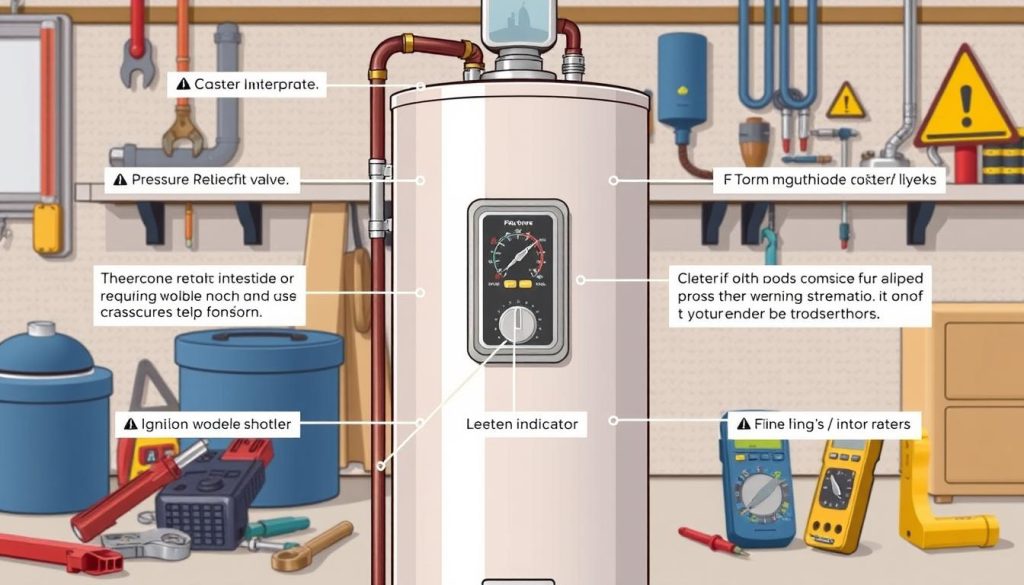
Gasoline water heaters can face many problems that need quick fixes. Knowing these issues helps keep your water heater running well. This prevents bigger problems later on.
Identifying Performance Problems
Homeowners often run into issues with their gasoline water heaters. The most common problems are:
- Insufficient hot water production
- Strange noises during operation
- Pilot light malfunctions
- Water temperature inconsistencies
- Unexpected leaks
Diagnostic Strategies for Gas-Fired Water Heaters
To solve problems with gas water heaters, you need a step-by-step plan. Here are some key steps:
- Check thermostat settings and functionality
- Inspect the pilot light and gas supply
- Examine the burner and heating elements
- Assess possible sediment buildup
| Problem | Potential Cause | Recommended Action |
|---|---|---|
| No hot water | Faulty gas control valve | Professional inspection |
| Lukewarm water | Sediment accumulation | Flush water heater tank |
| Unusual noises | Mineral buildup | Clean heating elements |
Solutions and Repairs
Some problems can be fixed by yourself, but others need a pro. Always prioritize safety when working with gas-fired water heaters.
“When in doubt, consult a professional technician to prevent safety risks and avoid more damage to your water heater.”
Big repairs like gas leaks, constant pilot light failures, and big leaks need a pro right away. Regular upkeep can stop many issues and make your water heater last longer.
Conclusion: Making the Right Choice
Choosing the right gasoline water heater is a big decision. It affects your home’s energy use, which is about 25% of your utility bills. You need to think about performance, cost, and your home’s needs.
The best water heater is one that balances cost and efficiency. Gas water heaters are efficient, with ratings from 80% to 90%. They are a good choice for reliable hot water. Think about the yearly costs, which are $136 to $343, and how they fit your budget and energy use.
New water heating technologies are coming, promising better efficiency. Hybrid and thermodynamic water heaters might offer even more savings. Keep up with these advancements for more eco-friendly and cost-effective options.
Your choice of water heater should match your home’s needs and your budget. Do your research and talk to experts. This way, you can find the best water heater for your home’s needs.
